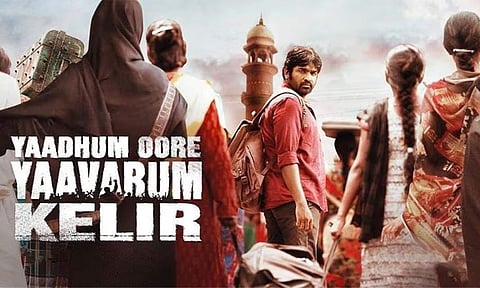Yaadhum Oore Yaavarum Kelir Movie Review: Asks the right questions even if it takes a prosaic route
Rating:(2.5 / 5)
Two small hands outstretched from the confines of a jail play an invisible piano envisioned out of the prison bars. The kid is a prodigious musical talent who doesn’t understand why he is away from his music and instruments. Almost a decade later, when he is released from prison, he finds himself inside a music store in Kerala. The teenager touches the strings of a guitar, the skin of a Tabla, and the keys of a piano. There is visible exhilaration, which is well-established by the actor. But why was he in prison? That kid was a refugee with no one to call family. Vijay Sethupathi’s latest Yaadhum Oore Yaavarum Kelir is a microcosm of many such stories of people who are struggling to find an identity and do not want to be labelled just as refugees.
Director: Venkata Krishna Roghanth
Cast: Vijay Sethupathi, Kanika, Vivek, Megha Akash
YOYK opens with a three-piece suit-wearing Vijay Sethupathi talking about the futilities of war, the concept of borders, and even the origin of the idea of countries. Of course, these are pertinent questions with no convincing answers, and the film soon shifts to a flashback where we see that young kid being sent from war-stricken Sri Lanka to London to pursue music. But a security check and some indiscriminate Lankan cops ensure his dream is quashed before he could play a single note on his beloved flute. Meanwhile, on the coast of Tamil Nadu, we see how a bunch of refugees from Eezham are Ill-treated by the powers that be. A defiant Kaniha’s fight back against the cops ends with a random gunshot.
Interestingly, director Venkata Krishna Roghanth doesn’t dwell too long on these two incidents, and we are left with Punidhan (Vijay Sethupathi) finding his way to a church through his music. While this journey allows us to have one more opportunity to see Vivekh on screen as he plays the Church Father, it also leads to a rather insipid romantic track featuring Punidhan and Matilda (Megha Akash). Be it their strange meet-cute or even Matilda replacing the memories of her dead father with Punidhan’s presence in her life, there are many things that feel out of place in YOYK's overall narrative. While it is understandable why a romantic track was needed in Punidhan’s life, the casting choice dampens the impact. Occasionally, the film is aware of the global issue it has taken up, and the writing brings in the antagonists through two cops who are in pursuit of Punidhan aka Kirubanadhi. It is the latter identity that gets him into trouble as he faces bureaucratic hell before finding a way to reach London to pursue his musical journey. Points to Nivas K Prasanna for a compelling score that does get too coercive at times, but it is a decent companion to a rather gripping central core.
In many ways, YOYK reminded me of Nagraj Manjule’s terrific Jhund where soon after showcasing the class and caste difference in sports, he focuses on showing the struggle of the underprivileged in getting simple things like an identity card. That problem is multifold in YOYK as people fighting for their identity are refugees who are so much in the periphery that they are not even a blip for anyone looking from the centre. YOYK does an excellent job of pointing out the public and government apathy towards their plight which has largely remained unchanged over decades. When one of the refugees in the special camp is ready to forego his love because he wants her to get married to a person with a valid identity, it is impossible to not be moved. When asked to not stand up in defence of themselves with the simple line, “How can you fight back for your identity and pride when you have neither?” it is a scathing indictment of how the odds are stacked against them for even exercising their basic human rights.
While these portions do work heavily in favour of the film, YOYK takes a long time to get there. And that path is anything but engaging. It is a nice touch to make the protagonist a musician, considering how music has no language, and hence, no boundaries. How even the slightest misstep on the part of the refugees can push their progress back by years is a telling commentary on how dispensable they are considered in the system. Whenever the film moves in this territory, including an impassioned speech that takes the film to a poignant yet laboured ending, YOYK manages to stay afloat. However, it feels bloated when the film moves away from it to tell a romantic story and a half-baked revenge story with no spark. Both these narrative threads take up half the runtime, and fall somewhere between grating and naive, and that is not really a good place to be.
For its merits and flaws, there is definitely something really honest in Yaadhum Oore Yaavarum Kelir. The questions it asks, and the points it puts forth aren’t some throwaway lines inspired by social media chatter. It calls for structural changes. It appeals to our empathetic sides to see the blatant inhumane conditions of a refugee’s existence. In fact, even when celebrating the one refugee who is destined for greatness, the film doesn’t forget to reiterate that it is not only the exceptions who need to be recognised, but every single person. The film might not always do justice to the theme at hand, but if those two outstretched hands that played sunlight piano can be held by the promise of a better future, then why not use this film as a conversation starter?

